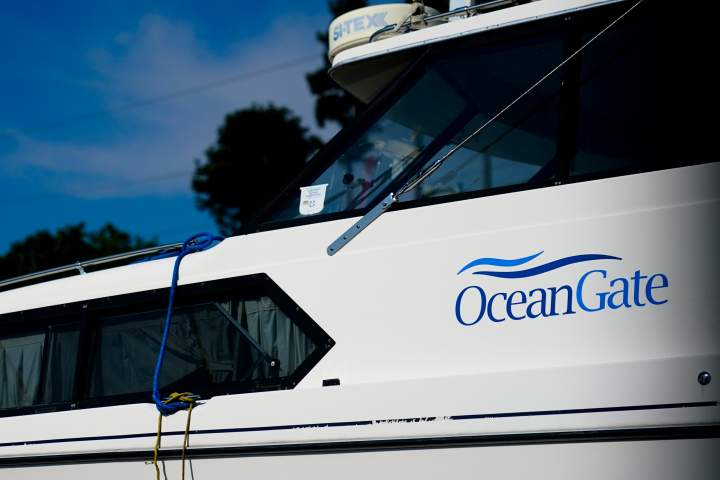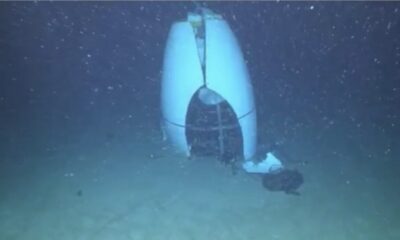Top Stories
U.S. Report: Titan Submersible Disaster Blamed on Flawed Culture

UPDATE: The final report from the U.S. Coast Guard has just revealed that the catastrophic implosion of the Titan submersible, which tragically killed five people on June 18, 2023, was primarily due to a “critically flawed” safety culture at OceanGate. This urgent announcement comes from the Marine Board of Investigation and sheds light on the deficiencies that led to the disaster.
The report, released earlier today, outlines severe lapses in OceanGate’s design and testing protocols. “OceanGate’s design and testing processes for TITAN did not adequately address many of the fundamental engineering principles that would be crucial for constructing a hull to the precision necessary for the intended operations in an inherently hazardous environment,” it states. This alarming revelation raises significant concerns about safety standards in deep-sea exploration.
The document also highlights that OceanGate’s operational practices were marred by “glaring disparities” between their written safety protocols and actual practices. The report cites a “toxic workplace culture” that discouraged employees from voicing safety concerns, fueled by a fear of termination. “OceanGate’s Chief Executive Officer’s sustained efforts to misrepresent TITAN as indestructible provided a false sense of safety for passengers and regulators,” the report asserts, calling into question the integrity of leadership at the company.
On the fateful day, the Titan submersible went missing in the northern Atlantic Ocean during an expedition to view the Titanic wreck site off the coast of Newfoundland. The vessel was reported overdue shortly after 9 p.m. local time. Among those aboard were a billionaire adventurer, a wealthy businessman and his son, and OceanGate’s CEO, all of whom tragically lost their lives.
The report indicates that OceanGate failed to conduct necessary analyses on the expected cycle-life of the Titan’s hull. It further points out that the company’s decision to continue using the Titan despite prior incidents undermined the vessel’s integrity. The carbon fibre design, deemed unreliable for deep-sea conditions, introduced flaws that weakened the overall structural safety of the hull. Each dive likely compressed and compromised the Titan, making it increasingly vulnerable over time.
As the investigation unfolds, the implications of these findings are profound, raising serious questions about regulatory oversight and the future of deep-sea tourism. The human cost of this tragedy cannot be overstated, as families mourn the loss of their loved ones in a preventable disaster.
The U.S. Coast Guard’s report serves as a wake-up call, emphasizing the urgent need for reform in safety practices within the submersible industry. Moving forward, authorities will be under pressure to implement stricter regulations to protect future adventurers and ensure that such a tragedy does not happen again.
Stay tuned for more updates as this story develops.
-

 Politics4 weeks ago
Politics4 weeks agoSecwepemc First Nation Seeks Aboriginal Title Over Kamloops Area
-

 World5 months ago
World5 months agoScientists Unearth Ancient Antarctic Ice to Unlock Climate Secrets
-

 Entertainment5 months ago
Entertainment5 months agoTrump and McCormick to Announce $70 Billion Energy Investments
-

 Science5 months ago
Science5 months agoFour Astronauts Return to Earth After International Space Station Mission
-

 Lifestyle5 months ago
Lifestyle5 months agoTransLink Launches Food Truck Program to Boost Revenue in Vancouver
-

 Technology3 months ago
Technology3 months agoApple Notes Enhances Functionality with Markdown Support in macOS 26
-

 Lifestyle3 months ago
Lifestyle3 months agoManitoba’s Burger Champion Shines Again Amid Dining Innovations
-

 Top Stories2 months ago
Top Stories2 months agoUrgent Update: Fatal Crash on Highway 99 Claims Life of Pitt Meadows Man
-

 Politics4 months ago
Politics4 months agoUkrainian Tennis Star Elina Svitolina Faces Death Threats Online
-

 Sports5 months ago
Sports5 months agoSearch Underway for Missing Hunter Amid Hokkaido Bear Emergency
-

 Politics5 months ago
Politics5 months agoCarney Engages First Nations Leaders at Development Law Summit
-

 Technology5 months ago
Technology5 months agoFrosthaven Launches Early Access on July 31, 2025

















